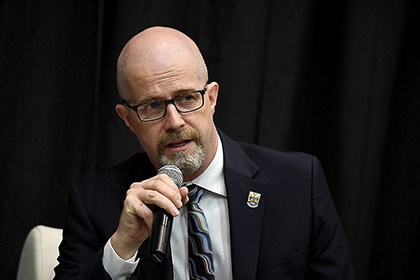The city's reserve funds totaled less than half in 2018 of where they stood two years previously, according to a staff report to council's finance and audit committee.
Amounting to $61 million million in 2016, they had declined to $26.1 million by the end of last year.
A drop in the endowment reserve played the biggest role. In 2016, it stood at $23.7 million, then dropped to slightly less than $5 million before rising to $8.3 million in 2018. The reserve is the source for the $12.6-million parkade to be constructed as part of the Park House condominium project.
The endowment fund is used to "provide long-term funding for projects that have no other viable source" as well as interim funding for general projects awaiting debt proceeds.
The water utility reserve was also a major factor, falling from $13.6 million in 2016 to a deficit of $942,089 two years later due largely to a $9.5-million upgrade of water service to the Hart.
Likewise, the sewer utility reserve fell from $5.5 million in 2017 to $780,824 to pay for installation of a new sewer main downtown.
However, the taxpayer may not have to foot much of the bill if council opts to replenish reserves.
For one thing, city can rely on about $8.4 million annually from other sources.
Revenue from the federal excise tax on gasoline accounts for $3.2 million and a portion of the property tax levy dedicated specifically to general infrastructure contributes $2.55 million. As well, $2.4 million in provincial gaming funds goes into the capital expenditure reserve, which also gets another $250,000 a year from other sources such as interest earned on the endowment fund.
Added to that, the city recently received boosts of $8.1 million from the provincial government and an additional $3.2 million from the federal government to spend on capital projects. And in late 2021, it's expected the city will get a $25 million boost when the 17-year lease-in, lease-out agreement with FortisBC is wrapped up.
Committee chair Garth Frizzell said the reserves are necessary to deal with unforeseen expenses and pointed to the snow control reserve as an example.
From $2.6 million in 2017, it stood at zero in 2018, prompting council to raise the property tax levy for that service by $1.5 million and push it up to $8.5 million a year. The hope is that will be enough to restore the reserve to the tune of $2.1 million.
"You can't predict whether this year is going to be a great year and we can accumulate a surplus or if it's going to be a terrible year and we spend it down to zero," Frizzell said. "Every day that they're out there it's about a quarter of a million dollars, so it doesn't take many snowfalls to burn through the entire year's budget."
In 2018, the city relied on reserves for about 65 per cent of its spending on capital projects, while debt and grants each accounted for less than 20 per cent.
The full report is posted with this story at pgcitizen.ca.



